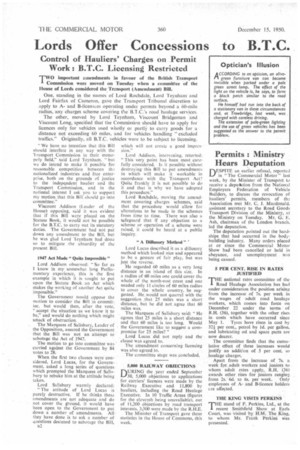Lords Offer Concessions
Page 36

If you've noticed an error in this article please click here to report it so we can fix it.
o B.T.C.
Control of !hullers' Charges on Permit Work : B.T.C. Licensing Restricted
TWO important amendments in favour of the British Transport I Commission were moved on Tuesday when a committee of the House of Lords considered the .Transport (Amendment) Bill.
One, standing in the names of Lord Rochdale, Lord Teynham and Lord Fairfax of Cameron, gave the Transport Tribunal discretion to apply to Aand B-licenstes operating under permits beyond a 60-mile radius, any charges scheme covering the.B.T.C.'s road haulage services.
The other, moved by Lord Teynham, Viscount. Rridgeman and Viscount Long, specified that the Commission should have to apply for licences only for vehicles used wholly or partlY to carry goods for a distance not exceeding 60 miles. and for vehicles handling "excluded traffics." Originally, all B.T.C. vehicles were to be subject to licensing.
" We have no intention that this Bill should interfere in any way with the 1 ransport Commission in their monopoly field." said Lord Teynham, " but we do intend to make it possible for reasonable competition between th 2 nationalized industries and free enterprise, both on the grounds of justice to the indepe,ndent haulier and the Transport Commission, and in the national interest I ask you to support my motion that this Bill should go into committee."
Viscount Addison (Leader of the House) opposing, said it was evident that if this Bill were placed on the Statute Book, it woad not be possible for the B.T.C. to carry out its statutory duties. The Government had not put down any amendment to the Bill, but he was glad Lord '1-eynham had done so to mitigate the absurdity of the present Bill.
1947 Act Made "Quite Impossible"
Lord Addison observed: So far as I know in my somewhat long Parliamentary experience, this is the first example in which it is sought to put upon the Statute Book -an Act which makes the working of another Act quite impossible."
The Government would oppose the motion to consider the Bill in commit-. tee, but would then, after the vote, "accept the situation as we know it to be," and would do nothing which might smack of obstruction.
The Marquess of Salisbury, Leader of the Opposition, assured the Government that the Bill was not an attempt to sabotage the Act of 1947.
The motion to go into committee was carried against the Government by 84 votes to 28.
When the first two clauses were considered, Lord Lucas, for the Government, asked a long series of questions which prompted the Marquess of Salisbury to rebuke him at the attitude being taken,
Lord Salisbury warmly declared:
"The attitude of Lord Lucas is purely destructive. If he thinks these amendments are not adequate and do not cover the ground, it would have been open to the Government to put down a number of amendments. Allthey have done is to ask a number of questions designed to sabotage the Bill,
H2 which will not create a good impression."
Lord Addison. intervening, retorted: 'This very point has been most carefully considered. Is it possible without destroying this Bill to put amendments in which will make it workable in accordance with the Transport Act? Quite frankly it is not possible to do it and that is why we have adopted this procedure."
Lord Rochdale, moving the amendment covering charges schemes, said that the procedure would allow for alterations to be made in the schemes from time to time. There was also a safeguard that if any objection to a scheme or operation of a scheme were raised, it could be heard at a public inquiry.
"A Dillasory Method"' Lord Lucas described it as a dillusory method which looked nice and appeared to be a gesture of fair play, but was just the reverse.
He regarded 60 miles as a very long distance in an island of this size. in a radius of 60 miles one could cover the whole of the north-east coast and one needed only II circles of 60 miles radius to cover. the whole country. he suggested. He.wohld not quarrel with the suggestion that 25 miles was a short distance, but he did not agree that 60 miles was.
The Marquess of Salisbury said: " tie agrees that 25 miles is a short distance and that 60 miles is too long. Would the Government like to suggest a compromise for 25 miles?"
_ Lord Lucas 'did not reply and the clause was agreed to.
The ainendment concerning licensing was also agreed to.
The committee stage was concluded,
5,000 RAILWAY OBJECTIONS
I-1 URING the year ended September 30, 5,000 objections to applications for carriers' licences were made by the Railsvay Executive and 11,800 by hauliers, including the Road Haulage Executive. In 10 Traffic Areas (figures for the eleventh being unavailable), out of 11,200 objections by road transport interests. 3,300 were made by the R.H.E.
The Minister of Transport gave these statistics in the House of Commons, this week.




































































































